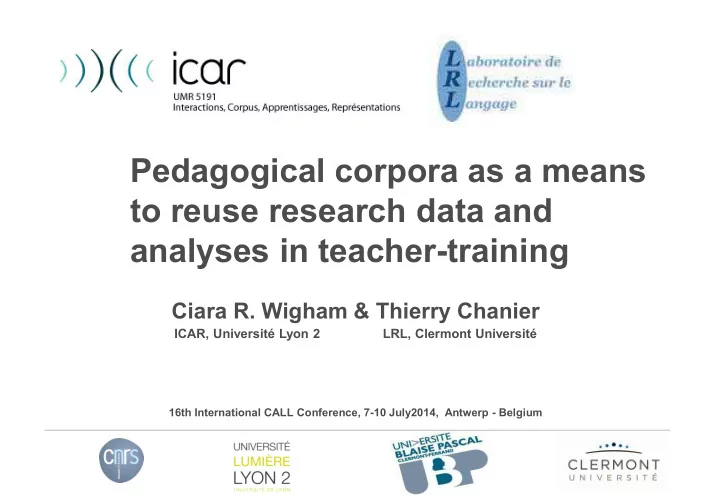

Pedagogical corpora as a means to reuse research data and analyses in teacher-training Ciara R. Wigham & Thierry Chanier ICAR, Université Lyon 2 LRL, Clermont Université 16th International CALL Conference, 7-10 July2014, Antwerp - Belgium
Approaches to teacher-training Authentic situations, multimodal materials Classroom video footage – Physical education (Roche & Gal-Petitfaux, 2012) – Educational sciences (Miller, 2009) – Mathematics (Santagata, 2009; Star & Stirkland, 2008) Video libraries – ViSA, Inside Teaching, NeoP@ss Stand alone resources / Accompanied by other ‘records of practice’ (Hatch & Grossman, 2009) 2
Video footage + Records of practice Records of practice: – Raw materials (curricular student work, course planning, instruction & assessment resources) – Research materials (interviews, notes, commentaries) A sense of what the classroom video might fail to capture Data for shedding light on the wider context in which a lesson or learning sequence is situated “ overarching purposes, histories, and long-term relationships invisible in daily interactions” (Hatch & Grossman, 2009:70). 3
Example – Inside Teaching corpus http://insideteaching.org multimodal resources description of teaching context description of inquiry context teacher reflective discussion session (research materials) class materials (raw materials) 4
Example – Sports teacher training http://archimede.datacenter.dsi.upmc.fr/projets-unf3s/intervenir-en- eps/co/INTERVENIR_EN_EPS_web.html links to research articles – written analysis online course includes raw access to materials ‘expert’ points of -lesson videos view on data -photos 5
Approaches to teacher-training in CALL • How to reuse data and analyses in ways that bridge the researcher-teacher gap? (Colpaert, 2013) • Guichon & Hauck (2011) : Confrontation with research findings Action research 6
7 LEarning and TEaching Corpora (LETEC) ethics & Pedagogical rights scenario Wigham & Chanier, 2013, C WorldCALL o Public licence n Analyses Instanciation t Reffay, Betbeder & Private licence e Chanier 2012, IJTEL x t Research protocol "A LETEC corpus collects in a systematic and structured way all the data from interactions which occur during a course which is partially or entirely online . These data are enriched by technical, pedagogical and scientific information as well as information about the participants and are organized to allow contextualized analyses to be performed. “ (Mulce-documentation, 2013) 7
Pedagogical Corpora Carefully documented and selected materials from online situations built on multimodal materials & records of practice / research data Leads identified in research analyses enhancing online enhancing online interaction L2 communication management Accompanied by structured training tasks 8
Open Access http://lrl-diffusion.univ-bpclermont.fr/mulce2 9
Example pedagogical corpus LETEC of the online course CoPéas (Communication pédagogique en environnement orienté audio synchrone) Master’s course in Distance learning English for Specific Purposes (Educational sciences) 10 weeks, 8 x 60min online tutored discussions Lyceum 14 students (A2, B1-B2), 2 native tutors (1 who had never taught online) Task = Produce a guide for creating an educational website 10
Teacher-trainee need identified Foster the writing of teaching journals – reflective practice One-sided view of the course situation More objective standpoint – > confront journal with other perspectives 11
Resources in pedagogical corpus Selected parts of the LETEC corpus – Extracts of interaction data (video, audio) – Student questionnaires – Extracts of post-course interviews Research article (Lewis, 2006) – Tutor’s diary 12
Tasks Multi-perspective data embedded into sets of collaborative activities instructions, timing guidelines, grouping, resources completed online or face-to-face Sample task – tutor’s impressions of course 1. Read the tutor’s journal 2. Note down : – positive impressions of course and reasons given – negative impressions and reasons – things tutor would have done differently 3. Identify recurrent themes under three headings. 4. Compare notes with partner. 13
Sample task – students ’ impressions Resources: Students ’ post questionnaire & students ’ reflective reports Task: 1. Find statements that : – support the tutor’s impressions – oppose the tutor’s impressions 3. Identify the aspects for which the tutor and student viewpoints differ. 4. Be prepared to present your findings to the class. 14
Objectives described Reflective teaching journals pedagogical corpus (Wigham & Chanier, 2013) – identify differing views of successful online collaboration; – summarise characteristics of successful collaboration and produce a list of implications for practice; – appraise the advantages of keeping teaching journals; – compare and contrast reflections from a teaching journal with naturally occurring data (interaction tracks) and researcher-provoked data (student feedback) 15
Integrating pedagogical corpora Teacher-training: moving from peripheral participation to a more centre one (Lave & Wagner, 1991) Pedagogical corpora – « expert viewpoint » (research cycle) : a starting point! Integrate their use into a more general process Encourage Encourage the Propose Encourage trainees to development pedagogical trainees to construct a of observation corpora reflect on reflective systems for based on their own discourse confrontation leads online around data of their self identified in reflexive teaching from their research discourse with practices own teaching analyses teaching data practices Need to trial corpora as next phase of our action research 16
Bridging the researcher – teacher gap pedagogical corpora research teaching During teacher-training encourage LETEC corpora from online confrontation of expert and novice views learning situations Move from research data to data from Findings from research studies their own teaching practices around these corpora « Reflective online teachers » 17
Thanks! Merci beaucoup ! thierry.chanier@univ-bpclermont.fr http://lrlweb.univ-bpclermont.fr/spip.php?rubrique98 ciara.wigham@univ-lyon2.fr http://icar.univ-lyon2.fr/membres/cwigham/ 18
Recommend
More recommend